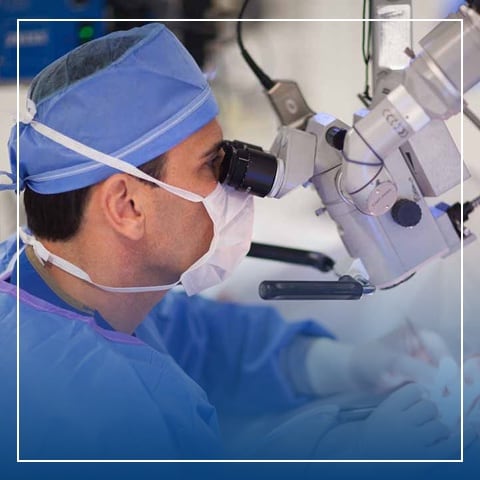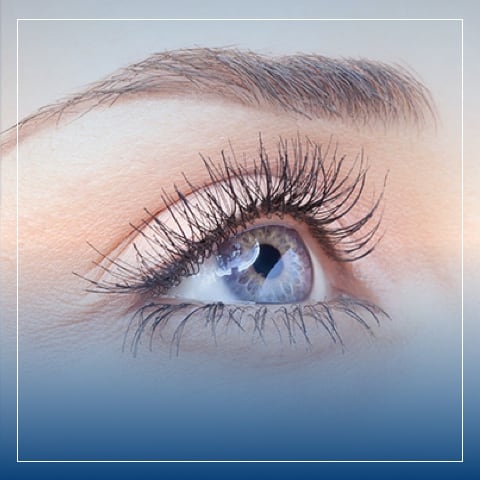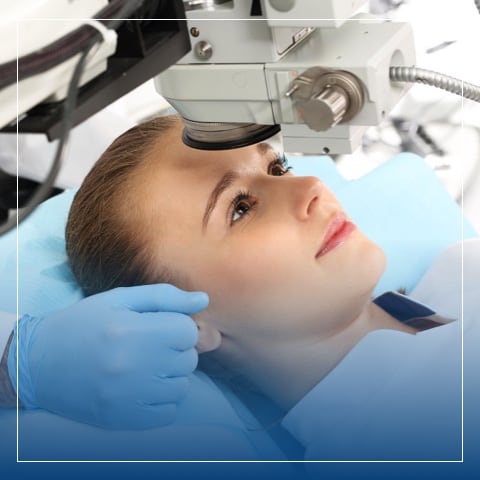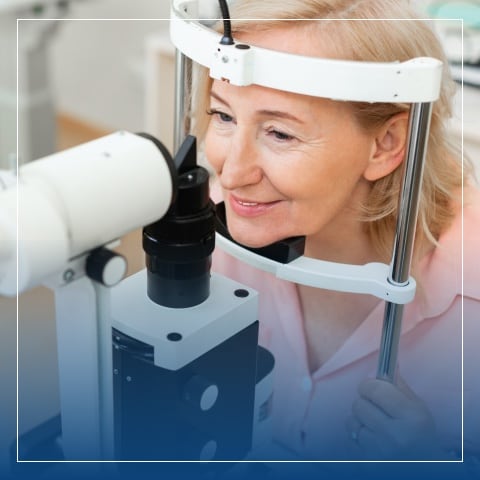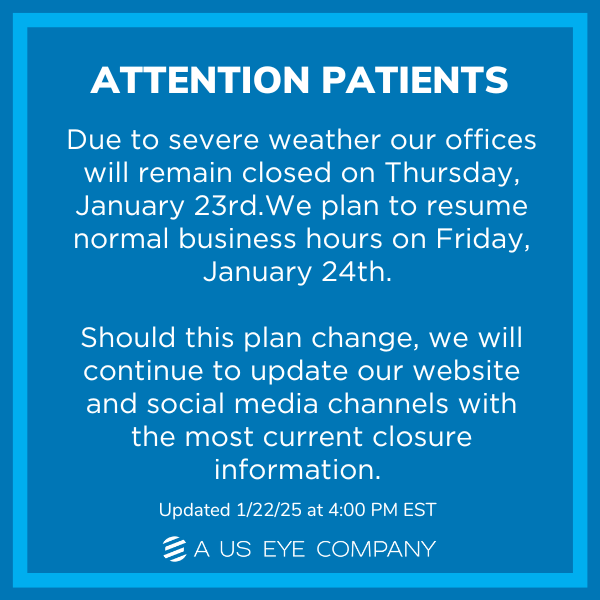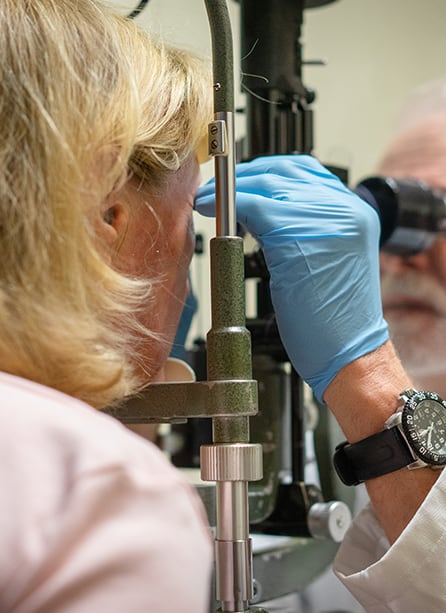

Prevent Vision Loss
Diabetes is a leading cause of vision loss in adults. Yet, most eye problems caused by diabetic eye disease are preventable. A regular diabetic retinopathy exam can help monitor changes to eye health and implement diabetic macular edema treatment before symptoms worsen.
The American Diabetes Association (ADA) recommends adults have yearly eye exams to protect vision and eye health. Contact Carolina Eyecare Physicians for diabetic eye care today.
What Is Diabetic Eye Disease?
The longer you live with diabetes, the more likely you are to develop conditions affecting your eye health. Both type 1 and type 2 diabetes can increase the risk of developing diabetic eye disease.
Diabetic eye disease is a group of eye problems including:
Diabetic eye disease can develop slowly, and patients may not initially notice symptoms or vision problems. Over time, high blood sugar levels cause damage to blood vessels in the eye. The damage can impair vision and interrupt essential eye functions.

Diabetic Eye Disease Overview
Diabetes can cause multiple eye problems, including blurry or double vision. Additional symptoms are specific to the type of eye condition. Take a closer look at how diabetes can lead to cataracts, diabetic macular edema, diabetic retinopathy, and glaucoma eye disease.
Cataracts
Excess blood sugar can cause changes in the eye’s lens, leading to cataract development. The hazy, cloudy spots can interfere with vision. In some cases, cataract eye surgery may be necessary to help improve visual comfort. Maintaining healthy blood sugar levels can help prevent cataracts or slow development.
Diabetic Macular Edema
Macular edema occurs when fluid buildup causes swelling and thickening of the macula. The swelling can damage the macula, causing vision impairment. Diabetic macular edema is typically caused by diabetic retinopathy.
Diabetic Retinopathy
Diabetic retinopathy is when abnormal blood vessels develop around the retina, often swelling or leaking fluid into the eye. Diabetes and poor blood sugar levels can lead to the growth of abnormal blood vessels.
Glaucoma
Glaucoma is a group of diseases that cause irreversible damage to the optic nerve. It usually develops as a result of increased eye pressure, which can occur when abnormal blood vessels leak excess fluid into the eye. Diabetes can double your chance of getting glaucoma.
Diagnosing Diabetic Eye Disease
At Carolina Eyecare Physicians, we use various diagnostic technologies to evaluate your eye health. Some common devices patients can expect at their next diabetic eye exam include fundus and retinal imaging technology.
Digital Fundus Imaging
Diabetic eye disease can affect essential tissue located at the back of the eye (the fundus). Fundus imaging uses a low-power microscope to photograph the interior surface and back of the eye, including the retina, macula, optic nerve, fovea, and blood vessels.
Digital fundus imaging is a noninvasive test that can be completed in a few minutes. The device captures images by peering through the pupil, so pupil dilation is necessary to effectively evaluate the back of the eye.
Optos Retinal Imaging
Optos retinal imaging creates a map of internal eye structures, particularly the back of the eye. Eyes have unique shapes, so what may be a normal structure for one patient may be abnormal for another. With a detailed map of your eye, your eye doctor can monitor changes to eye structures to assess your ocular health.
Zeiss Clarus 500 Retinal Imaging
The Clarus 500 retinal imaging technology provides 200° high-resolution color fundus imaging. Capturing details about the unique shape and structure of your eyes is crucial for diagnosing eye conditions. Color imaging can help your eye doctor track even subtle changes inside the eye.

Book Your Diabetic Eye Exam
Yearly diabetic eye exams can help patients preserve their vision. Patients with eye problems may require more frequent exams to observe eye tissue and vision changes. Talk to your eye doctor about exam frequency and what you can do to protect your eye health. Book a diabetic eye care exam with Carolina Eyecare Physicians.
Locations
We have several convenient locations throughout South Carolina. Please view the nearest location to you or get directions below.
Our Services
News
Protect Your Eyes at Work: Eye Exam Basics for Busy Employees
Eye ExamReviewed By: Dr. Denise Carter, OD Deadlines loom, inbox alerts ping, and the glow of a monitor fills your field of view. In the rush, it’s easy to ignore the slow burn behind your eyes or the text that looks just a shade fuzzier than yesterday. Modern jobs pile on visual stress all day long, […]
Read More… from Protect Your Eyes at Work: Eye Exam Basics for Busy Employees
The Role of Diabetic Eye Exams in Preventing Age-Related Macular Degeneration
Diabetic Eye ExamsReviewed By: Dr. Kimberly Carter, OD Eyes often seem fine until, almost overnight, road signs fade or print looks washed in fog. In many cases, the trouble started months earlier, deep inside the retina where fragile vessels and macular cells respond to high blood sugar. A once‑a‑year dilated diabetic eye exam remains the surest tool for […]
Read More… from The Role of Diabetic Eye Exams in Preventing Age-Related Macular Degeneration
How Light Adjustable Lenses Are Redefining Post-Cataract Vision Correction
Light Adjustable LensReviewed By: Dr. Kerry Solomon, MD The field of ophthalmology has taken a major leap forward with the introduction of the Light Adjustable Lens (LAL) by RxSight, offering a groundbreaking alternative for patients undergoing cataract surgery. At Carolina Eyecare Physicians, we’re proud to offer this cutting-edge solution that gives patients the opportunity to achieve truly […]
Read More… from How Light Adjustable Lenses Are Redefining Post-Cataract Vision Correction
Protect Your Eyes at Work: Eye Exam Basics for Busy Employees

Reviewed By: Dr. Denise Carter, OD Deadlines loom, inbox alerts ping, and the glow of a monitor fills your field of view. In the rush, it’s easy to ignore the slow burn behind your eyes or the text that looks just a shade fuzzier than yesterday. Modern jobs pile on visual stress all day long, […]
Read More… from Protect Your Eyes at Work: Eye Exam Basics for Busy Employees
The Role of Diabetic Eye Exams in Preventing Age-Related Macular Degeneration
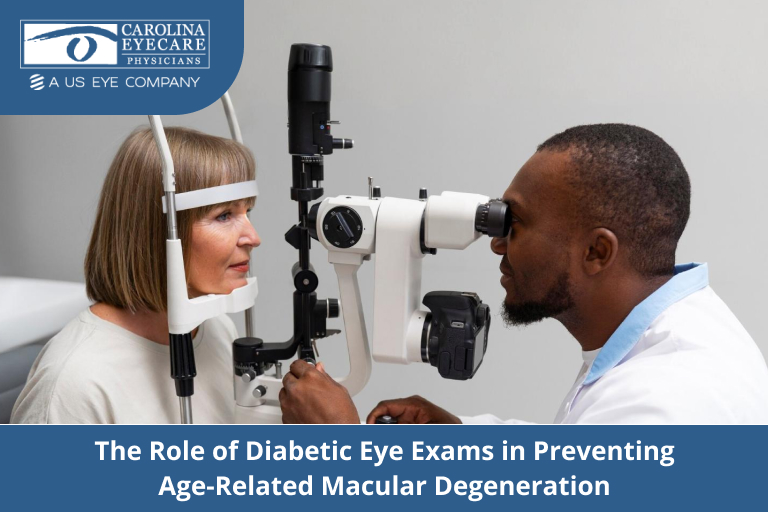
Reviewed By: Dr. Kimberly Carter, OD Eyes often seem fine until, almost overnight, road signs fade or print looks washed in fog. In many cases, the trouble started months earlier, deep inside the retina where fragile vessels and macular cells respond to high blood sugar. A once‑a‑year dilated diabetic eye exam remains the surest tool for […]
Read More… from The Role of Diabetic Eye Exams in Preventing Age-Related Macular Degeneration
How Light Adjustable Lenses Are Redefining Post-Cataract Vision Correction

Reviewed By: Dr. Kerry Solomon, MD The field of ophthalmology has taken a major leap forward with the introduction of the Light Adjustable Lens (LAL) by RxSight, offering a groundbreaking alternative for patients undergoing cataract surgery. At Carolina Eyecare Physicians, we’re proud to offer this cutting-edge solution that gives patients the opportunity to achieve truly […]
Read More… from How Light Adjustable Lenses Are Redefining Post-Cataract Vision Correction


We are a proud partner of US Eye, a leading group of patient-centric, vertically integrated multi-specialty physician practices providing patients with care in ophthalmology, optometry, dermatology, audiology, and cosmetic facial surgery.

